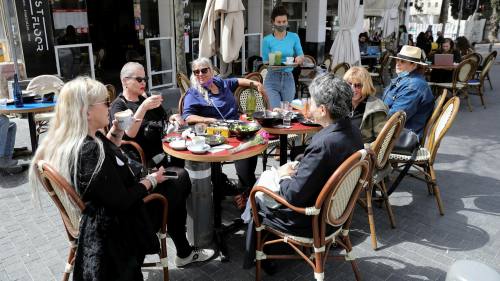High vaccination rates help loosen pandemic curbs, but there are fears that some are here to stay

With nearly no restrictions, and close to no enforcement of those that remain, Israel has raced out of the pandemic. Parties have spilled out on to the streets, children giggle in school playgrounds and beaches heave with families.
With the vast majority of its elderly population already inoculated, and millions more already under the protection of their first jab, the country has made an educated bet to trust in the vaccine. New infections are down to 3 per cent of those tested, hospitals are emptying and epidemiologists are cautiously optimistic. If new vaccine-defying variants can be kept at bay, Israel may be the first nation to tame the pandemic and open up its economy for good.
A month after my second jab, I embraced this new normal and invited 30 of my vaccinated friends to a joyful, mask-less party at my house. For more than a week now, restaurants have been jammed, nightclubs and bars are spilling over with joyous revellers and masks, still mandated by law indoors, are quickly vanishing.
The initial giddiness aside, Israel has become the test case for what life after the pandemic could look like. For now, some restrictions remain — no more than 20 people are allowed indoors, for instance, although the rule is largely being ignored. There is also an acrimonious debate on how to manage the return of Israelis stranded abroad for months.
But health officials warn that the country is not yet free of Covid-19. The R number, the holy grail of epidemiologists for the past year, still hovers just below 1, for instance, as a long tail of lingering infections bedevils communities that have been hesitant to get vaccinated. They include the Arab-Israeli community and the ultra-orthodox Jewish minority — both of which were hit hard by the pandemic — but also a hardcore of secular, city-dwelling vaccine deniers. “Put your vaccine up your ass,” screamed one at a protest that took place by the old Ottoman clock tower in Jaffa.
Others are less strident, open to being slowly wooed by the enticements on offer from the government. These include a “green passport” scheme, which generates a barcode on your phone to be checked by staff at leisure establishments. If fully rolled out, it will leave those without a vaccination certificate finding life after the pandemic as limited as it was during the crisis.
“Maybe, if I can’t DJ at a nightclub without the green passport, I will get the vaccine,” says one sceptic, declining to give his name because he is already being hassled by his friends and parents.
Without overtly declaring it, the government’s policy has largely been to keep an eye on hospital admissions instead of overall new infections — if the young catch coronavirus because they didn’t take the vaccine, but stay out of hospitals, it’s an outcome the state can live with.
The most tempting carrot being dangled by the government is the promise of travel without quarantine. Even Israeli citizens have found it nearly impossible to return home in recent months. Starting this week, up to 3,000 people a day will be allowed in — up from just 200 a week — if they are approved by the health ministry.
Plans being debated would replicate the success of Australia and some south-east Asian nations in keeping foreign infections at bay with forced quarantine at a hotel or at home while fitted with an electronic tracking bracelet.
The government plans to eventually let those vaccinated in Israel travel freely — perhaps even without quarantine upon returning home. It’s a risk, according to Nachman Ash, the country’s coronavirus tsar, who believes that without careful monitoring, such as with electronic bracelets, Israel could soon fall prey to new variants.
But for now, there’s not much reason to leave the country. The party is happening here.
No comments:
Post a Comment